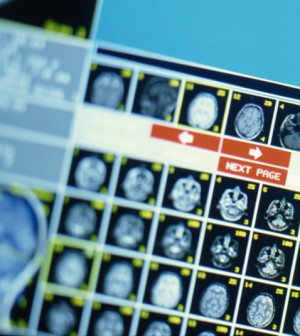- Could Your Grocery Store Meat Be Causing Recurring UTIs?
- Are You Making This Expensive Thermostat Error This Winter?
- Recognizing the Signs of Hypothyroidism
- 10 Strategies to Overcome Insomnia
- Could Artificial Sweeteners Be Aging the Brain Faster?
- Techniques for Soothing Your Nervous System
- Does the Water in Your House Smell Funny? Here’s Why
- Can a Daily Dose of Apple Cider Vinegar Actually Aid Weight Loss?
- 6 Health Beverages That Can Actually Spike Your Blood Sugar
- Treatment Options for Social Anxiety Disorder
Health Highlights: May 5, 2016

Here are some of the latest health and medical news developments, compiled by the editors of HealthDay:
Chimp Attack Face Transplant Recipient is Battling Graft Rejection
A face transplant received by a woman disfigured in a chimpanzee attack is being rejected by her body.
Charla Nash of Connecticut received the face transplant in 2011 and was taking part in an experiment in which doctors attempted to wean her off the anti-rejection drugs she has taken since the transplant, the Associated Press reported.
The experiment by doctors at Brigham and Women’s Hospital in Boston was funded by the U.S. military. Anti-rejection drugs can have serious side effects and the experiment involving Nash was part of a larger effort to investigate alternatives for service members who require transplants due to combat injuries.
Nash is back in the hospital and doctors hope to reverse the rejection of her face transplant by ending the experiment, the AP reported.
“I gave it my all and know my participation in the study will still be beneficial,” Nash said in a statement to the AP. “I’d do it all over again, if I could. The men and women serving our country are the true heroes.”
—–
California Governor Signs Bill Raising Smoking Age to 21
Bills that raise the smoking age from 18 to 21, expand no-smoking areas at public schools and restrict the use of electronic cigarettes in public places were signed into law Wednesday by California Governor Jerry Brown.
The bills were supported by a coalition of medical groups including the California Medical Association (CMA), the American Cancer Society, the American Heart Association and the American Lung Association, the Los Angeles Times reported.
“It is long past due for California to update our approach to tobacco, and with the governor’s signature on these life-saving bills, we have done just that,” CMA President Steven Larson said.
But Brown vetoed a bill that would have permitted counties to hold voter referendums on implementing local tobacco taxes to pay for the healthcare costs of people with tobacco-related diseases, the Times reported.
“Although California has one of the lowest cigarette tax rates in the nation, I am reluctant to approve this measure in view of all the taxes being proposed for the 2016 ballot,” Brown wrote in his veto message for the bill.
Copyright © 2026 HealthDay. All rights reserved.










